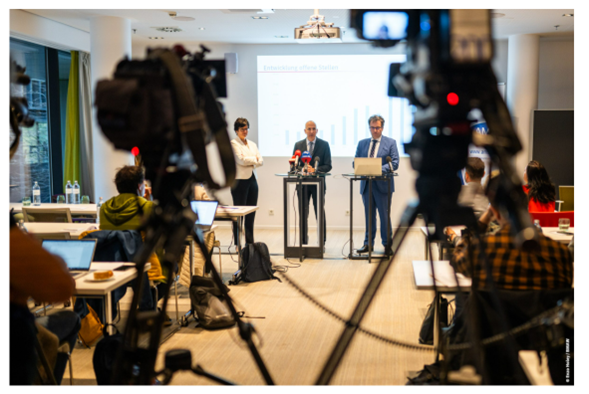
On the occasion of the European Year of Skills, the Federal Ministry of Labour and Economy initiated and elaborated last year a Non-Paper as a contribution to the European Year of Skills. Based on a long-established and strong tradition of social partnership in Austria, the Austrian Federal Economic Chamber, the Federation of Austrian Industries, the Federal Chamber of Labour and the Austrian Trade Union Federation provided their valuable contributions and views on the topical issues raised in the Non-paper.
The Non-paper gives a short overview of the current and future challenges of labour shortages and presents the most recent examples of successful initiatives developed to tackle these challenges and overcome the skills mismatches.
To effectively address labour and skills shortages, Austria has developed tools and initiatives, a few of which are highlighted in the Non-paper:
-
Skilled Worker Barometer: Provides quarterly data on skilled labour shortages, enabling early trend identification and faster responses (introduced June 2023);
-
Competence Matching Tool: Matches labour demand and supply based on skills and qualifications (presented November 2023);
-
Environmental Foundation: Facilitates training in "green" occupations (established April 2022);
-
Dual Academy: Offers vocational training for students with a General High School diploma, particularly AHS-Matura;
-
Higher Vocational Education: Introduces practical vocational training programmes at tertiary education levels (EQF levels 5-7).
The Non-paper also suggests:
-
Initiating dialogue among EU Member States;
-
Focusing on evidence-based and practice-oriented education and qualification measures geared to labour market needs;
-
Prioritising skills needed for green and digital transitions;
-
Involving social partners and enterprises;
-
Validating non-formally and/or informally acquired competencies;
-
Leveraging Centers of Vocational Excellence (CoVEs).
More on the Competence Matching Tool
The Public Employment Service (AMS) turns the spotlight on innovation in the job placement process with the new skills matching system. Instead of the usual binary search based on job titles, individual skills profiles are created to promote swift, accurate and successful job placements. Companies benefit by no longer searching for job titles, but for the required skills. The Competence Matching Tool is based on an up-to-date AMS database that describes each occupation in detail. In contrast to the usual job search engines, the new tool enables a comprehensive match, even if the job titles are different or certain aspects are missing in the profile.
For more information on the European Year of Skills in Austria, including events and best practices like the Skilled Worker Barometer and the Competence Matching Tool, visit www.year-of-skills.gv.at. This also includes a report on the High-Level Conference "Green and Digital Skills: Opportunities and Challenges for the Future" held on 1 December 2023, in Vienna.
The discussions over the past year have clearly demonstrated the interest and the urgent need for tackling our common challenge of labour and skills shortages. Austria hopes that the Austrian best practice examples and the ideas on these issues laid out in the Non-paper can further deepen the dialogue within and between the EU Member States as well as cooperation on the comprehensive spectrum of the skills agenda, including beyond the European Year of Skills.
Details
- Publication date
- 29 April 2024
